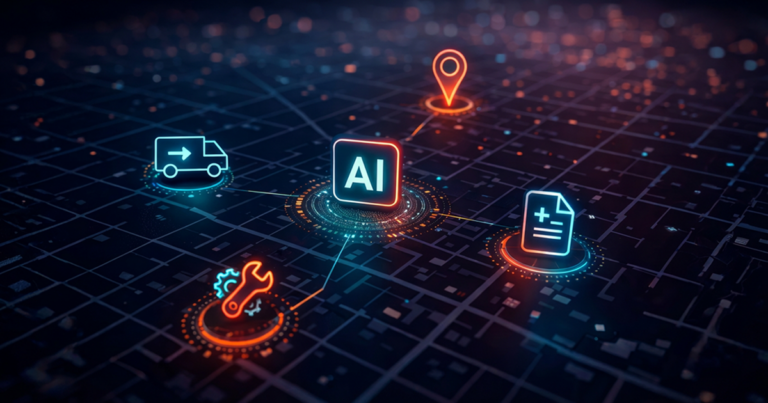The transformative impact of Large Language Models in Field Service Management
Field Service Management (FSM) is experiencing a profound shift due to rapid advancements in Artificial Intelligence (AI). At the forefront of these innovations are Large Language Models (LLMs), a type of generative AI designed to understand, predict, and generate human-like language. LLMs excel at analyzing, summarizing, and creating content, allowing them to respond to user requests in natural, conversational language. While industries globally have benefited from LLMs by leading AI firms like OpenAI, their specific applications in field service are unlocking new levels of efficiency, cost savings, and sustainability.
Streamlining ticket analysis
One of the most critical uses of LLMs in field service is improving the efficiency of ticket analysis. Companies often handle thousands of service tickets daily, each containing complex detailed information. Analyzing these details manually is both time-consuming and prone to human error. LLMs excel in understanding and interpreting natural language, enabling them to analyze and categorize tickets swiftly and accurately.
Fieldcode, in partnership with the Green AI project, is advancing such initiatives to evaluate service tickets, determining if issues can be resolved remotely and recommending necessary parts. This initiative aims to increase first-time fix rates, reduce site visits, and optimize resource use, contributing to greater operational efficiency and environmental sustainability.
Enhancing predictive maintenance
LLMs are pivotal in predictive maintenance, where they analyze historical data and technician notes to detect patterns and foresee equipment failures. For instance, Siemens has integrated LLMs into its platform, achieving a 20% reduction in unplanned machine downtime.
This integration enhances data analysis from IoT sensors and historical maintenance cases, enabling more informed decision-making and improving overall operational efficiency in industrial settings.
Real-time support for field technicians
Another significant and direct benefit of LLMs in field service is real-time support for technicians. LLMs can be integrated into mobile platforms, allowing technicians to receive step-by-step guidance and answers to complex repair questions via natural language interactions. Research conducted by the National Bureau of Economics found that the implementation of generative AI led to a 14% increase in agent productivity, as measured by the number of issues resolved per hour.
Many leading platforms are incorporating capabilities that allow technicians to capture images of issues using mobile devices. LLMs can analyze these images and provide troubleshooting steps based on historical data and technical documentation. This functionality not only speeds up problem resolution but also enables technicians to work more independently, reducing reliance on back-office support.
Improving customer interactions
LLM technology is also enhancing customer interactions within field service operations. Advanced chatbots powered by LLMs enable customers to engage in self-service options, such as scheduling appointments or troubleshooting minor issues, without needing direct human assistance. This not only streamlines the resolution process but also improves the overall customer experience by providing timely updates and personalized service options.
A study by Gartner predicts that conversational AI will reduce customer service labor costs by $80 billion by 2026. This projected reduction highlights how AI-driven chatbots can enhance efficiency and response times, allowing customers to access real-time status updates and receive relevant notifications for a smoother, more responsive service experience.
Conclusion
As we move forward into an era where operational excellence is paramount, the adoption of LLM technology will be crucial for organizations aiming to stay competitive while meeting evolving customer expectations. While the journey to fully harness the benefits of LLMs in field service is just beginning, the potential rewards are substantial.
At the same time, secure implementation of these technologies remains a top priority. SaaS platforms integrating LLMs must ensure data protection by focusing on data encryption, access controls, and regular security audits to safeguard sensitive information effectively.
For those interested in real-world applications of these advancements, Fieldcode offers insights on optimizing ticket dispatching. Explore our blog on the top features for setting up the perfect start to dispatching to learn more.



